A
Auto Express
Guest
Mercedes has refined the GLA in all the right places. Compared to the original model, it’s more practical, offers advanced driver-assistance tech and is a comfortable place in which to travel. When you add in a strong range of petrol, diesel and plug-in hybrid powertrains, plus powerful AMG versions, along with the improved quality of materials throughout the cabin, the GLA has noticeably come of age.
Despite these obvious plus points, the downside is that the GLA is pricey compared to the competition and, if you make the decision to purchase, the running costs are also a little steep. However, it remains a genuine contender for families seeking a small, premium SUV.
The first Mercedes GLA SUV was launched in 2014 to a rather modest fanfare. Although it was a supposed premium product, designed to take on the likes of the BMW X1, Volvo XC40 and Audi Q3, it fell short in a number of key areas. The interior was a little cramped, the ride wasn’t particularly comfortable and the bland styling didn’t inspire a sense of desirability.
It was telling that the original GLA design was often referred to as just an ‘A-Class on stilts’, which points directly to the perception of it as more of a high-riding hatch than a well-rounded compact SUV. This time around, the car gets a more individual design to set it apart from the A-Class and it feels more like a fully fledged SUV, just like its rivals do.
Mercedes has clearly decided to challenge that perception with the second-generation GLA. It’s a full 11cm taller than the previous model and, with the wheelbase extended by 30mm, the manufacturer claims there’s now more interior space. There’s also a bigger boot which means the GLA can compete on a practical level with the rivals mentioned above, while providing more load space than the Mazda CX-30, Lexus UX and even the Range Rover Evoque.
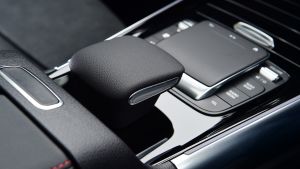
image
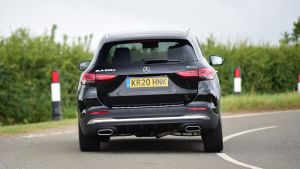
image
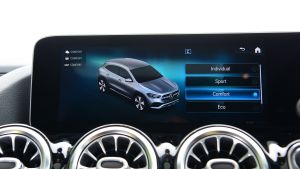
image
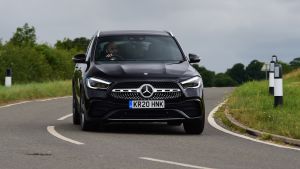
image

image
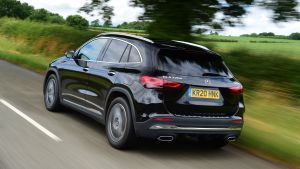
image
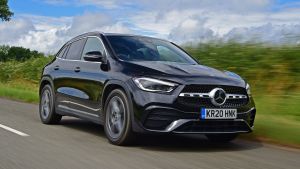
Mercedes GLA driving
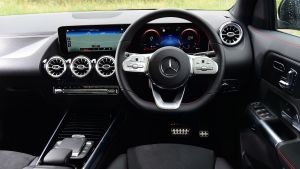
image
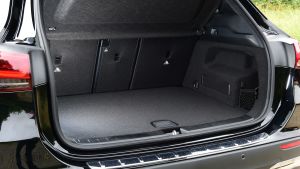
image
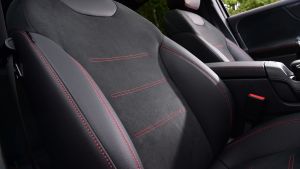
image
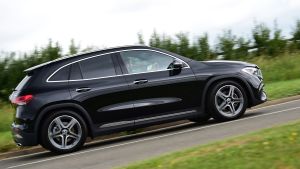
image
Performance is well taken care of with a range of petrol, diesel and plug-in hybrid engine options. The GLA 180 and 200 versions are powered by a 1.3-litre petrol unit, although with different outputs of 134bhp and 161bhp, respectively. The GLA 250 variant boasts a more potent 221bhp from its 2.0-litre petrol engine. All cars use an eight-speed automatic transmission, with the exception of the GLA 200 which has a seven-speed auto ‘box.
Those completing higher mileages might want to opt for the diesel GLA 200 d with 148bhp, or the GLA 250 d which produces 187bhp. The 200 d is available with Mercedes’ 4Matic four-wheel-drive system while the 250 d gets it as standard.
The most efficient GLA is the 250 e plug-in hybrid, which combines 1.3-litre petrol power with an electric motor to deliver a total output of 215bhp. High-mileage drivers may still be better off with a diesel as once the battery is flat the GLA 250 e has similar running costs to a normal petrol model. Meanwhile, the Mercedes EQA is heavily based on the GLA and is fully electric, yet costs roughly the same amount as the plug-in hybrid GLA 250 e.
Mercedes hasn’t forgotten those who desire plenty of pace to go with the SUV practicality, however. At the top of the GLA range sits the Mercedes-AMG GLA 35 with 302bhp and the extreme 415bhp GLA 45 S, both using a 2.0-litre petrol powerplant and turning in some serious performance figures.
In addition to the broad new engine range, the exterior design offers a sharper, more focused look, with Mercedes including nine individual trim levels for customers to choose from.
Starting with the entry-level Sport models the range moves through to the bolder-looking AMG Line Premium Plus cars, while the plug-in hybrid versions are only offered with Exclusive trim levels. The Mercedes-AMG variants boast further luxury kit and specific trim and tech enhancements.
Continue reading...
Despite these obvious plus points, the downside is that the GLA is pricey compared to the competition and, if you make the decision to purchase, the running costs are also a little steep. However, it remains a genuine contender for families seeking a small, premium SUV.
About the Mercedes GLA
The first Mercedes GLA SUV was launched in 2014 to a rather modest fanfare. Although it was a supposed premium product, designed to take on the likes of the BMW X1, Volvo XC40 and Audi Q3, it fell short in a number of key areas. The interior was a little cramped, the ride wasn’t particularly comfortable and the bland styling didn’t inspire a sense of desirability.
It was telling that the original GLA design was often referred to as just an ‘A-Class on stilts’, which points directly to the perception of it as more of a high-riding hatch than a well-rounded compact SUV. This time around, the car gets a more individual design to set it apart from the A-Class and it feels more like a fully fledged SUV, just like its rivals do.
Mercedes has clearly decided to challenge that perception with the second-generation GLA. It’s a full 11cm taller than the previous model and, with the wheelbase extended by 30mm, the manufacturer claims there’s now more interior space. There’s also a bigger boot which means the GLA can compete on a practical level with the rivals mentioned above, while providing more load space than the Mazda CX-30, Lexus UX and even the Range Rover Evoque.

image

image

image

image

image

image

Mercedes GLA driving

image

image

image

image
Performance is well taken care of with a range of petrol, diesel and plug-in hybrid engine options. The GLA 180 and 200 versions are powered by a 1.3-litre petrol unit, although with different outputs of 134bhp and 161bhp, respectively. The GLA 250 variant boasts a more potent 221bhp from its 2.0-litre petrol engine. All cars use an eight-speed automatic transmission, with the exception of the GLA 200 which has a seven-speed auto ‘box.
Those completing higher mileages might want to opt for the diesel GLA 200 d with 148bhp, or the GLA 250 d which produces 187bhp. The 200 d is available with Mercedes’ 4Matic four-wheel-drive system while the 250 d gets it as standard.
The most efficient GLA is the 250 e plug-in hybrid, which combines 1.3-litre petrol power with an electric motor to deliver a total output of 215bhp. High-mileage drivers may still be better off with a diesel as once the battery is flat the GLA 250 e has similar running costs to a normal petrol model. Meanwhile, the Mercedes EQA is heavily based on the GLA and is fully electric, yet costs roughly the same amount as the plug-in hybrid GLA 250 e.
Mercedes hasn’t forgotten those who desire plenty of pace to go with the SUV practicality, however. At the top of the GLA range sits the Mercedes-AMG GLA 35 with 302bhp and the extreme 415bhp GLA 45 S, both using a 2.0-litre petrol powerplant and turning in some serious performance figures.
In addition to the broad new engine range, the exterior design offers a sharper, more focused look, with Mercedes including nine individual trim levels for customers to choose from.
Starting with the entry-level Sport models the range moves through to the bolder-looking AMG Line Premium Plus cars, while the plug-in hybrid versions are only offered with Exclusive trim levels. The Mercedes-AMG variants boast further luxury kit and specific trim and tech enhancements.
Continue reading...
